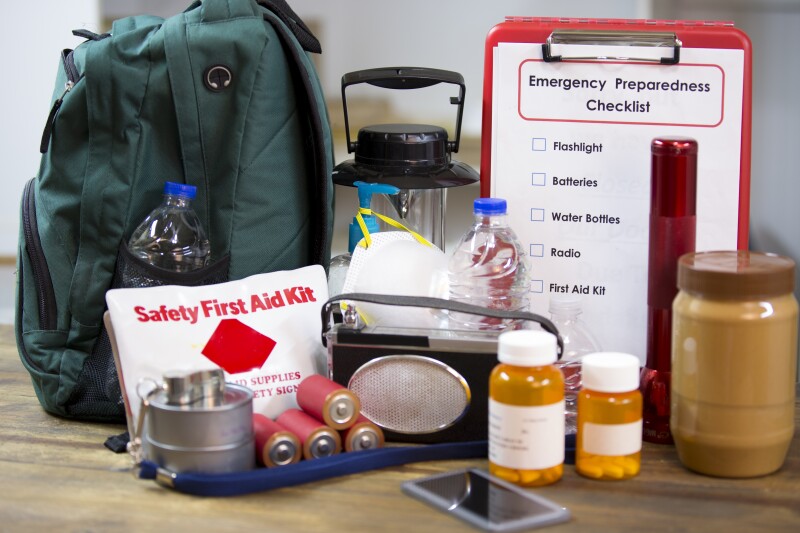“Emergency preparedness” can be a triggering phrase for some people. It might feel overwhelming and intimidating to some; for others, it may bring on worries about current financial insecurities or the prophesied natural disasters associated with the Second Coming. But preparing for emergencies doesn't need to be a fearful or discouraging process. All it takes is a mindset shift to feel more secure in your plans for emergency situations.
Think about it this way: If your power is out for a few days but your home is safe, you’ll likely want to have a supply of clean water and basic shelf-stable food in your pantry until you can get to the grocery store again. But if you need to quickly evacuate your home, you’ll need a portable emergency kit because your 20-pound bag of flour isn’t going to cut it.
Building up your food storage and assembling an emergency kit may seem overwhelming. But preparing now for emergencies is like paying for insurance—it might feel cumbersome or unnecessary, but it will be a great blessing later on if unexpected challenges arise.
Emergency preparedness isn’t something that’s only been taught over the pulpit in recent decades—it’s a principle we can learn from even the most beloved scripture stories, like the parable of the ten virgins.
In Matthew 25, Christ tells the story of the ten virgins; five were wise, and five were foolish. The five wise virgins had extra oil for their lamps, but the five foolish virgins didn’t. So when the bridegroom took much longer than expected to attend the marriage, the five foolish virgins ran out of oil.
While the oil in this story is often likened to faith, conversion, and testimony in preparation for the Second Coming, it is also a literal reminder of physical preparedness. There will always be periods and seasons of life that catch us by surprise, and the last thing we want to be is unprepared.
Queue emergency kits and food storage! If you have no idea where to start, here are a few basics you need to know.
First stop: Emergency Kit
An emergency kit should be easily accessible, portable, and filled with basic necessities you might need if you were forced to leave your home in a flash.
There are a couple of things you’re sure to have already thought of when it comes to an emergency kit: food, water, medical supplies, and a flashlight. You can purchase a few items at a time to build up your emergency pack, gather up extra unused items from around your house (you probably have at least one extra flashlight lying around somewhere), or you can purchase a kit that’s already assembled for you (this one even includes waterproof matches and playing cards—not a bad idea!).
Besides food, water, and medical supplies, both the Church and the Red Cross recommend having a few other important items included in your emergency pack:
- Copies of important documentation (such as medical information, proof of address, deed/lease to home, passports, birth certificates, and insurance policies)
- Change of batteries (and back-up cellphone battery)
- A small amount of cash in case bank systems are inaccessible
▶ You might also like: 14 genius items to include in a 72-hour kit that you may not have considered
Besides preparing your emergency kit, consider preparing an emergency plan with family members or close friends. Consider questions like, “Where will we meet up if we’re separated?” and “What disasters should we prepare for?” Elder L. Tom Perry counseled that having a plan prepares us and our families against the uncertainties of the future. He taught, “The great blessing of being prepared gives us freedom from fear, as guaranteed to us by the Lord in the Doctrine and Covenants: ‘If ye are prepared ye shall not fear’ (Doctrine and Covenants 38:30).”
Next up: Food Storage
Building up food storage can provide security in times of trouble like natural disasters, but it can also help in unforeseen circumstances like long-term illness or seasons of unemployment when your budget might be tighter than usual and your three-day emergency kit won’t get you very far.
The Church recommends having three components in your food storage:
- Three-month food supply: this should contain food that you are already incorporating into your diet (like extra jars of peanut butter, canned fruits and vegetables, or macaroni and cheese).
- Long-term food supply: Long-term food storage is made up of food staples like wheat, flour, rice, pasta, beans, and oats—foods that have a shelf life of over 30 years. You can also buy long-term supply food kits like this dinner and breakfast package or this dinner only package.
- Water reserve: you’ll want to store at least one gallon of water per person per day.
▶ You might also like: What’s the Church’s current recommendation on food storage?
It’s unrealistic to assume that a long-term food storage supply or even a three-month stash can be taken care of in one trip to the store. President Gordon B. Hinckley taught, “We can begin ever so modestly. We can begin with a one week’s food supply and gradually build it to a month, and then to three months. … this counsel is not new. But I fear that so many feel that a long-term food supply is so far beyond their reach that they make no effort at all.”
For some, the prospect of fitting several years’ worth of extra food staples into the weekly grocery budget may look impossible at first. Instead, try building up your storage bit by bit. Buy one or two items each week at the grocery store and set them aside for your food storage—you’ll be surprised at how quickly your supply accumulates!
The goal with emergency preparedness is to cover your bases in case of short-term evacuation or long-term setbacks—not to add to stress and worry to your already full plate. There are too many things that happen in our world today that we have little to no control over, and we certainly don’t have power to decide when difficulties may arise in our lives. But we do have power to prepare! And there are lots of ways to do that—by obtaining an education, saving, avoiding debt, and building up food storage.
But remember, preparing and planning is not the same as worrying. When Jesus gave the Sermon on the Mount, He taught His disciples to lay up treasures in heaven and consider how God cares for the needs of His people, even as He clothes the lilies of the field. After those comforting words came one final admonition at the end of Matthew 6:
“Take therefore no thought for the morrow: for the morrow shall take thought for the things of itself. Sufficient unto the day is the evil thereof.”
Now you might read that scripture and think, “How can I not think about tomorrow? How can I not plan for the future?” But the Lord isn’t telling us not to plan for tomorrow. Instead, He’s saying don’t worry about tomorrow because tomorrow will take care of itself. He’s saying that what’s happening today—our efforts and actions—is enough. We can’t control the outcomes of our tomorrows, but we can control the actions of today.
So when you face the task of preparing food storage or an emergency kit, keep those words in mind. Tomorrow will take care of itself. Control and do what you can today—that will always be enough.


